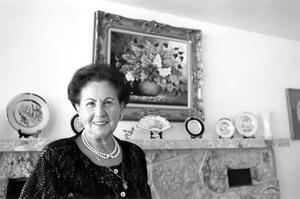Magda Schaloum
Holocaust survivor Magda Altman Schaloum speaks out on behalf of all Holocaust survivors and their families. Born and raised in Hungary, she endured acts of antisemitism throughout her childhood, and in 1944 and 1945, Magda was sent to several concentration camps. She lost both her parents and her brother. Magda met her husband, Isaac Schaloum, in a Displaced Persons Camp in Germany. Isaac was from Salonika, Greece. They emigrated to Seattle in the 1950s, where Isaac became a tailor and businessman, and they raised three children. Although of Hungarian descent, Magda became an active and beloved member of Seattle’s Sephardic community. She volunteers for many Jewish organizations, including the Washington State Holocaust Education Resource Center, and continues to bear witness to the horrors of hatred and antisemitism.
Magda describes her Hungarian family background, mother's death, father's remarriage, and memories of growing up in Hungary. There was one synagogue in her town, an Orthodox synagogue that all the Jewish families from the surrounding area attended. Growing up, Magda experienced "strong" antisemitism in town. She talks about her experiences in school, her relationships with her siblings, and the ubiquitous presence of the SS [Schutzstaffel]. Magda remembers the anti-Jewish measures enacted in Hungary between 1938 and 1941. These laws prevented Jews, including Magda, from pursuing higher education and finding employment. Instead, Magda learned a trade and became an umbrella maker, commuting sixty miles to Budapest to work. As early as 1939, Magda recalls Jewish men being taken away to labor camps and the restrictions and rationing worsened for Jews. Magda's sister, Chava, worked for an orphanage and was able to help many of the younger children avoid deportation to concentration camps. Chava and her future husband escaped with help from the Swedish diplomat Raoul Wallenberg. On April 1, 1944, Magda, her brother, and her mother were transported to Auschwitz by cattle car and separated by Josef Mengele upon arrival. She recalls seeing her father for the last time from the window of the crowded wagon. Magda details the atrocious conditions and treatment she endured at Auschwitz. In June of 1944, Magda was transferred to the infamous slave-labor camp, Plaszow, near Krakow, where Oskar Schindler’s enamel factory was located. Conditions in Plaszow were even more miserable. Magda describes enduring beatings, forced labor, squalid conditions, lice infestation, and inhumane treatment from the guards. Magda discusses the end of the war, being transferred to Muhldorf, a concentration camp in Bavaria, where she met her future husband, Izak, and the eventual liberation by Allied soldiers. Magda talks about life after the war, getting married in Germany, and starting her family before moving to Seattle in 1951. The Jewish Family and Child Service was a vital support to Magda and her family when they first arrived. Izak found work as a tailor, and in 1953, they opened a Federal Army and Navy Surplus store, where Magda worked while she raised their three children. Magda discusses her life in Seattle – the social life of immigrants, the synagogue they attended, the Sephardic community in Seattle, and adjusting to a new language and customs. Finally, Magda reflects on her husband's stroke and illness, the history of their business, her children and grandchildren, and her life as a widow.



